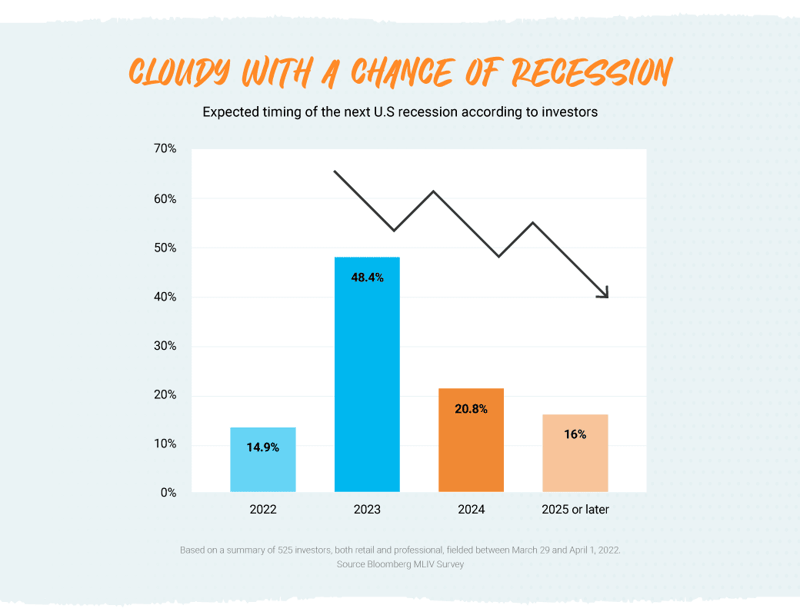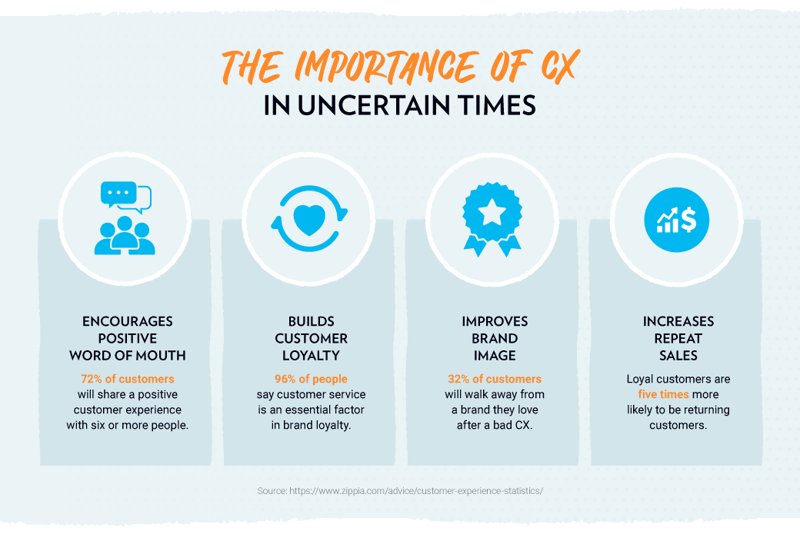- Blog
- How to rise above economic uncertainty and succeed
How to rise above economic uncertainty and succeed

“The World Bank sharply lowered its growth forecast for the global economy this year as persistently high inflation has elevated the risk for a worldwide recession,” the Journal reported, highlighting the uncertainty being “injected” by ongoing issues in China and Ukraine. 1
“The bank expects global growth to slow to 1.7% in 2023, down from an estimate of 3% growth in June. That would mark the third-weakest pace of global growth in nearly three decades, overshadowed only by the 2009 and 2020 downturns.” 1
Business uncertainty has become a way of life during the past few years, with a global pandemic, soaring inflation, supply chain issues, rising interest rates and ongoing talent shortages combining to heap pressure on executives and the teams they lead.

These uncertain times are showing no signs of abating any time soon, as evidenced in a KeCustomer Experience (CX) technology y Issues 2023 webinar hosted by global research firm Everest Group where leading experts highlighted large companies “are all acting in some sort of fear of recession by taking a conservative stance towards their human capital to the extent of layoffs”2.
Six tips for rising above economic uncertainty
While economic uncertainty is a reality for businesses in 2023, it is also the case that such concerns can be eased and even overcome. All it takes is education, planning and a willingness to get in front of a crisis rather than waiting for it to arrive.
- Re-examine budgets - agility is crucial in uncertain economic times and that is never more so than when negotiating budgets. If the pandemic proved anything, it is the need for businesses to quickly adjust to changing circumstances. While developing a business plan forecast may be a six to nine-month process in non-volatile times, be prepared to aim for a faster response in ever-evolving conditions. It may even be a case of devising temporary budgets to navigate the next three to six months before reverting to a long-range plan when economic conditions stabilise, as they surely will.
- Be transparent with staff and customers - uncertainty can quickly lead to anxiety and the best executives or business leaders ease such stress on those around them. You may have to make tough decisions but being honest and open with not only your team but your customers will prove beneficial in both the short and long term. If staff do not receive timely and correct details, they will likely fill the void themselves and there is no faster route to misinformation and poor morale than letting a rumour mill run wild. Likewise, communicating with clients will play a crucial role in maintaining their trust and ensuring their ongoing support. Also, transparency should be a year-round concern, with a Harvard Business Review study finding 70% of workers are most engaged in their jobs when senior management communicates openly with them3.
- Continue to invest in CX - a study of 724 organisations in mid-2022 found that more than half of companies were planning to increase spending on Customer Experience (CX) technology in 20234. Now is not the time to cut back on such investment. While budgets may need to be re-examined (see Tip 1), CX is far too important to the modern customer to risk diminishing, as evidenced by a recent Deloitte report found consumers who have positive experiences with a brand will spend 140% more with that company. Intelligent automation and AI solutions such as machine learning, IVR and NLP technology, virtual agents and AI chatbots are allowing organisations to deliver better CX without investing in more labour. A great example is Oration, a cloud-based call routing plug-in that uses the latest generation of speech recognition technology and an AI language interpreter to determine caller intent, fast-track customer calls to the most appropriate outcome and reduce Average Handling Time.

- Consider outsourcing - as one of the largest costs for organisations, it is inevitable in uncertain times that many businesses rush to reduce staffing levels. Rather than downsizing or eliminating entire functions though, a smarter option is to tap into the benefits of partnering with outsourcing providers that specialise in finding quality team members to complement those working in-house. While many executives are aware of the financial benefits (eg: the Philippines offers labour cost savings of up to 70%), outsourcing also offers access to recruitment pools overflowing with professional and highly educated job candidates – welcome relief given the ongoing talent shortage.
- Use quality data - in times of uncertainty, people search for answers and when it comes to business uncertainty, so many of those answers can be found in data. Organisations have never had more access to tools and solutions that collect and collate information that can then be used to develop strategies and prioritise planning to navigate volatility. By identifying emerging concerns such as rising costs, supply chain disruptions or shrinking labour markets, executives can prepare road maps and practical solutions to counter them. Similarly, quality data can help identify investment opportunities or potential markets to be explored.
- Embrace RPA - companies cannot afford for staff to waste their precious time on mundane and repetitive tasks at the best of times, let alone when there is increasing need to focus on business outcomes. A key component of any digital transformation strategy, Robotic Process Automation (RPA) is the perfect solution for organisations that want to increase efficiencies, improve accuracy and allow their people to spend more time on more valuable work. The technology creates software robots that can learn, mimic and executive rules-based processes and, most importantly, complete jobs faster, more efficiently and more accurately 24 hours a day, 7 days a week and 365 days per year.
Summary
Executives may not be able to control the economy but they can control their businesses, be it by readjusting their budgets, embracing a new resourcing model or stepping up CX efforts when others are cutting back. Ultimately, the most successful and enduring organisations are those that consider recession-proofing an everyday exercise, one that begins long before a recession is even predicted, and are prepared to evolve when circumstances necessitate.
With contact centres an integral part of the CX offering, executives are on a mission to adopt advanced tools and solutions to offer superior customer experiences. Discover four CX technology trends set to sweep the contact centre environment in 2023.
1 World Bank Cuts 2023 Global Growth Projection as Inflation Persists - WSJ
2 Everest Group Reports - View (everestgrp.com)
3 hbr_achievers_report_sep13.pdf
4 In Times of Economic Uncertainty, Invest in CX Technologies | No Jitter
5 Creating Effective Customer Experience Strategies | Deloitte US

.jpg)
